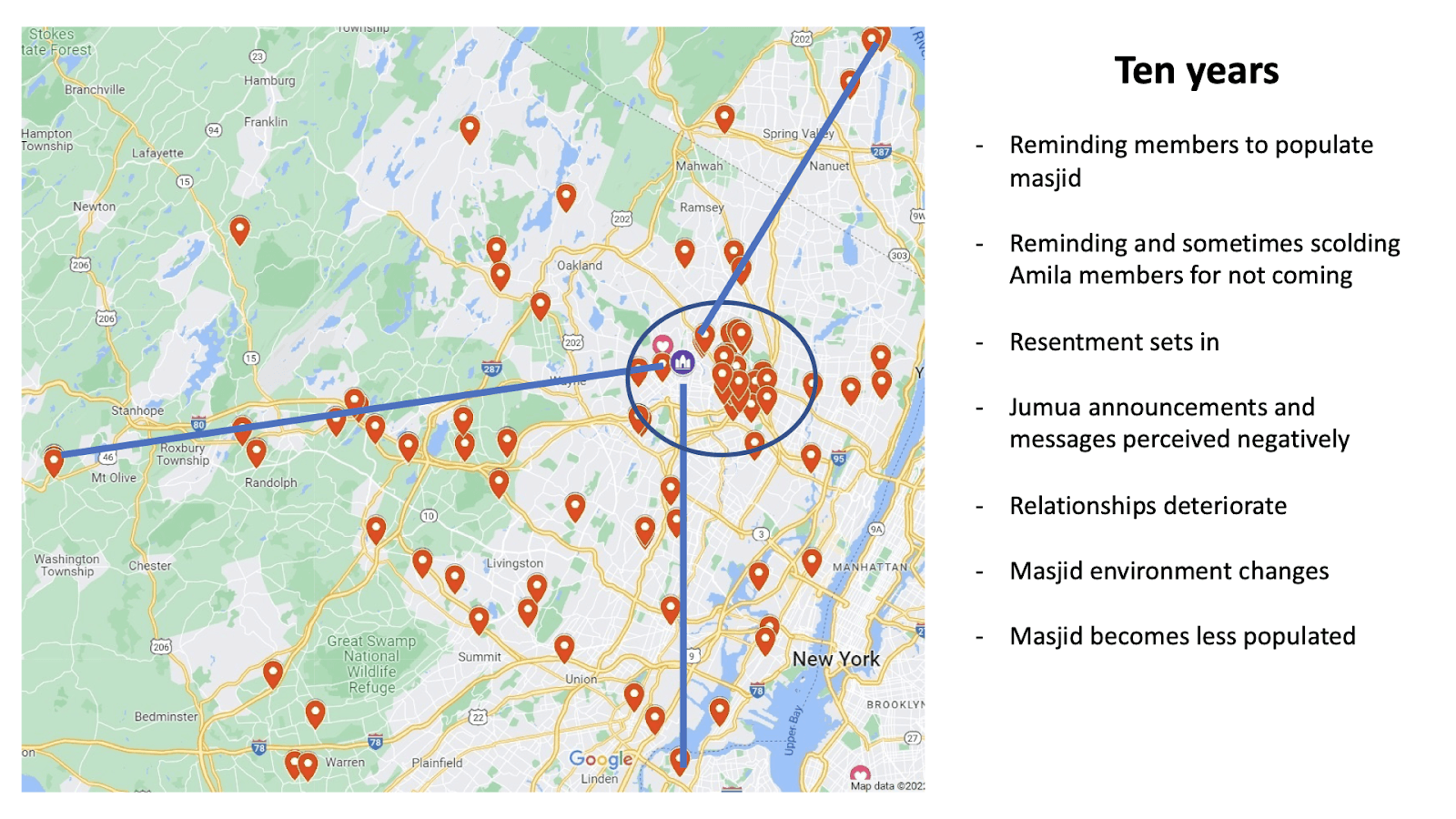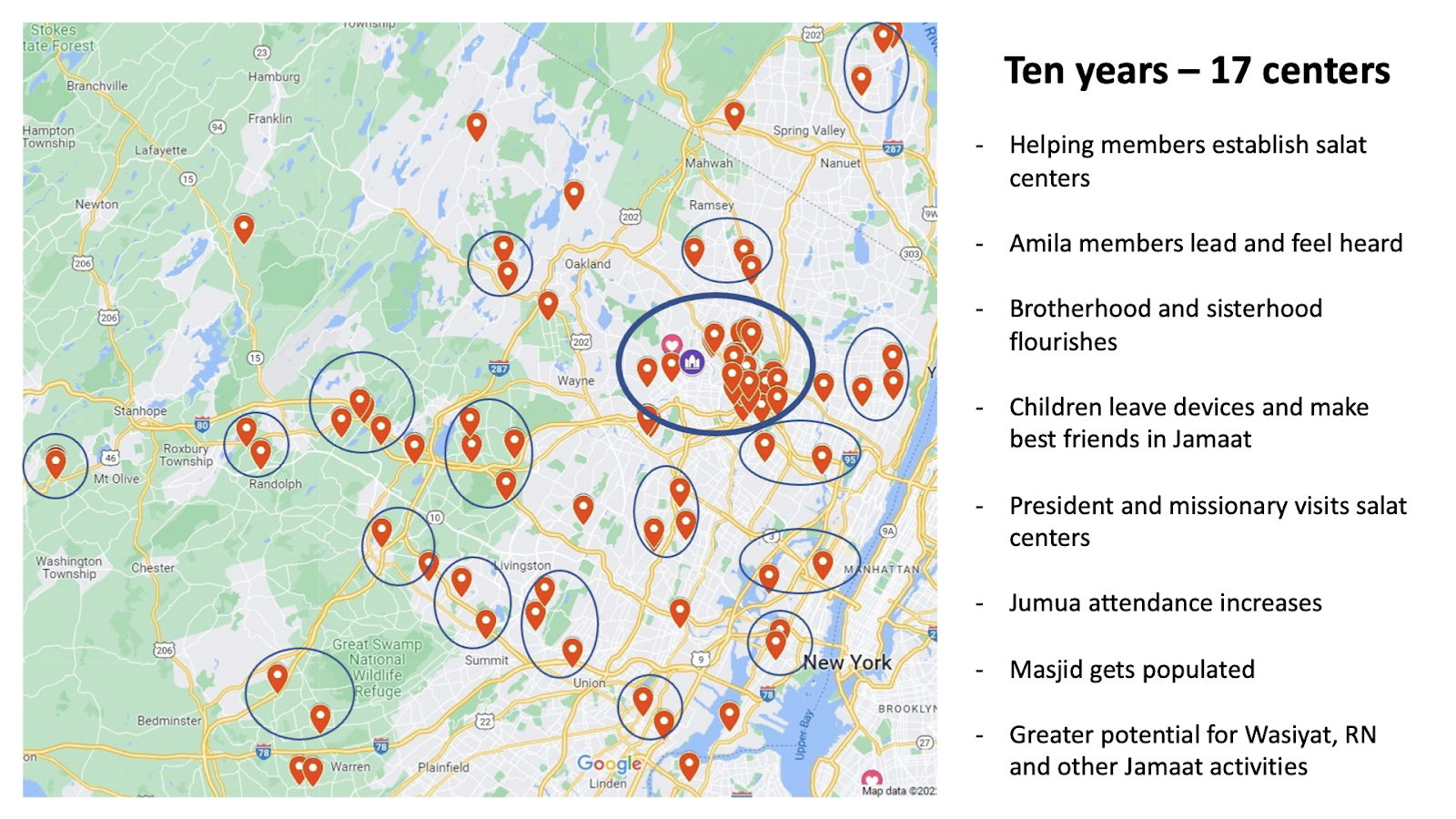Setting up Salat Centers
in your Jama'at
Establish
- Collect Addresses of members of the Jamaat
- Map them out (may use Google MyMaps. See below)
- Find clusters of homes within 15 min (or same zip code)
- Present to Local Islahee Committe and Amila. Get buy-in from both the bodies
- Identify hosts from each cluster and explain to them the process.
- Work with missionary to appoint Imam for each Salat center
- Explain rules of Salat center to other members in the cluster as well
Best Practices
Members should:
- Perform wudhu at their own homes and proceed to the salat center.
- Come on time, not too early, but never late. Prayers should start on time without waiting for people to show up. Please don’t call the host saying you’re “just five minutes away.”
- Leave immediately after prayers. Do not expand the scope of this program.
Members should not:
- Do not invite people without the knowledge of local Tarbiyat Secretary or Jamaat president.
- Do not offer any meal/ refreshments before or after prayers. It can set a precedent and become a burden for someone else offering their up their own location as a Salat Center.
- Do not add additional items to Salat. Sustaining a dars, Q/A sessions, discussions or refreshments becomes very difficult in the long run.
Maintainance
- Keep monitoring the health of Salat centers during the Salat Asharas
- Make sure the host is not burdened beyond the original plan
- Report status of Salat centers to local Amila monthly
- Track new members and facilitate congregational salat for them at mosque or Salat centers
Creating custom maps using Google MyMaps
- Get a list of addresses of your members on a spreadsheet
- Upload to mymaps.google.com
- My Maps will show all the homes in the map
- You can now visually group the clusters
- Watch a video on how to use Google MyMaps


The First Home Salat Center
(Hazrat Itbaan bin Malik) belonged to the Banu Salim bin Auf branch of the Khazraj tribe. The Holy Prophet (sa) established a bond of brotherhood between him and Hazrat Umar (ra). Hazrat Itbaan participated in the Battles of Badr, Uhud and Khandaq. He began to lose his eyesight during the lifetime of the Holy Prophet (sa) and passed away during the reign of Hazrat Muawiyah.
According to one narration, when Hazrat Itbaan bin Malik (ra) lost his eyesight, he sought permission from the Holy Prophet (sa) to be excused from attending the mosque for congregational prayer. The Holy Prophet (sa) asked him whether he could hear the Adhan [call to prayer], to which he replied in the affirmative. The Holy Prophet (sa) therefore did not grant him permission to be excused. This is a very well-known Hadith and is often quoted, however there are some more details related to this account. According to a narration from Sahih Bukhari, the Holy Prophet (sa) later granted permission to Hazrat Itbaan (ra) to offer his prayers at home. If people cannot get to the Mosque because of the extreme weather conditions and difficulties, it is permissible to offer prayers at home on the condition that the prayer should be offered in congregation and there is no excuse for this. Thus, this should always be borne in mind. Here in these countries, if the mosque is at a distance and there is also no means of transportation, then as I have said on many occasions, the Ahmadis should offer their homes as Salat centres where the local neighbouring Ahmadis can gather and offer their prayers in congregation. May God Almighty enable everyone to adhere to these injunctions.

